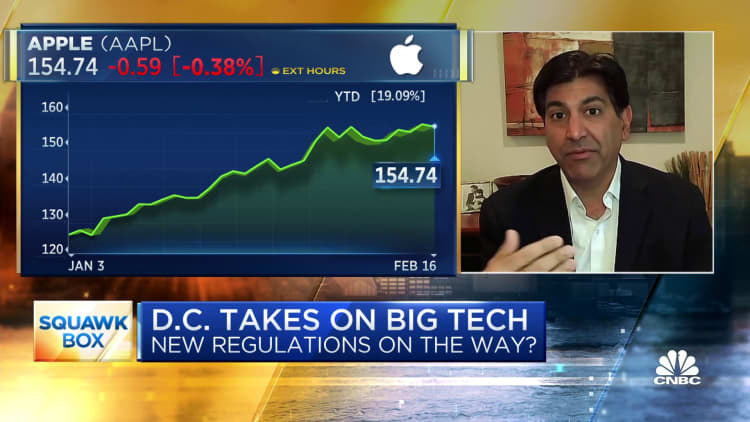Demonstrator on the issue of net neutrality at the U.S. Capitol February 27, 2018 in Washington, DC.
Getty Images
Net neutrality is poised for a resurgence after the Federal Communications Commission voted Thursday to begin the process of reestablishing the so-called open internet rules.
The vote revives a debate that last came to a head in 2017 when the agency voted to reverse the net neutrality rules created just a couple of years earlier. The back and forth occurred while Congress declined to codify the principles of net neutrality — that internet service providers (ISPs) should treat all traffic equally without blocking or throttling — into law.
Democrats Rosenworcel, Gomez and Geoffrey Starks voted to approve the move, while the two Republicans, Carr and Simington, dissented.
FCC Chair Jessica Rosenworcel announced her intention to reestablish the rules shortly after Democrat Anna Gomez was sworn in as the fifth and final commissioner at the agency, establishing a Democratic majority for the first time during the Biden administration. The president’s prior nominee, Gigi Sohn, faced persistent opposition from several lawmakers to be confirmed, before withdrawing from consideration. In the meantime, the agency was left in a deadlock.
Now that the commission voted to approve the notice of proposed rulemaking, the public will get a chance to comment on the proposal. After that, the agency will read and consider feedback from the public in crafting a final rule.
Net neutrality opponents say the Trump-era repeal of the rules shows that hyperbolic claims that such a move would result in the end of the internet as we know it were not borne out.
Republican Commissioner Brendan Carr pointed to statements from Democratic lawmakers in support of net neutrality and called the earlier campaign for the rules a “viral disinformation campaign.”
Carr later added that “Title II is a solution that won’t work to a problem that does not exist.”
“We’re now faced with advocates who can’t accept that they won and that we have de facto net neutrality,” Republican Commissioner Nathan Simington said.
Specifically, Republicans and ISPs have generally opposed that the FCC’s rules would reclassify the providers under Title II of the Communications Act of 1934, which would regulate them as a public utility. Opponents fear that could eventually open the door to the commission imposing price controls on ISPs.
“The goalposts have moved but the goal remains the same: increasing government control over the internet,” Carr said.
“From my perspective, ISPs are the most competitive they’ve ever been and forcing utility regulation onto them now is the wrong move at the wrong time,” Simington said.
Proponents point out that the threat of the rules’ return and the enactment of net neutrality rules in California have likely kept ISPs from implementing egregious internet traffic discrimination.
“In effect we have open internet policies that providers are abiding by right now,” Rosenworcel said. “They’re just coming from Sacramento and places like it. But when you are dealing with the most central infrastructure in the digital age, come on. It’s time for a national policy.”
Disclosure: Comcast is the owner of CNBC parent company NBCUniversal.
WATCH: Proposed policies around internet gatekeepers could increase competition, says frmr. White House CTO



























































![Mason Ramsey – Twang [Official Music Video] Mason Ramsey – Twang [Official Music Video]](https://i.ytimg.com/vi/xwe8F_AhLY0/maxresdefault.jpg)

















:quality(85):upscale()/2025/01/15/863/n/49352476/9e69ba8767880fdc9084b2.84057222_.png)

